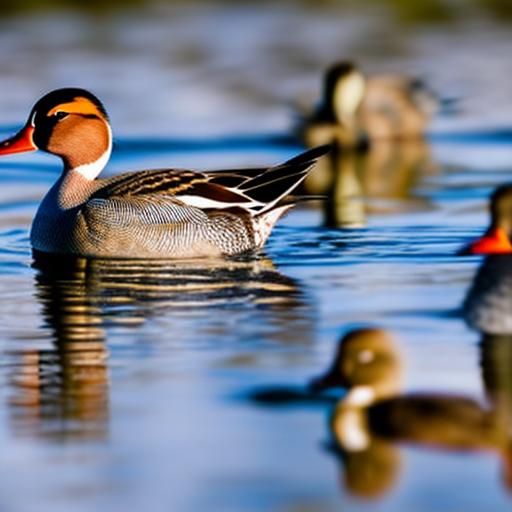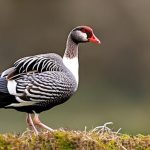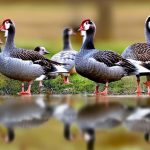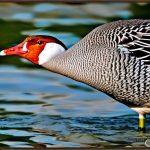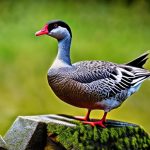Keeping ducks and geese together can be a rewarding and enjoyable experience for poultry enthusiasts. Both ducks and geese are waterfowl species that share similar needs and behaviors, making them compatible companions. Personally, I have had the pleasure of keeping ducks and geese together on my farm for several years, and I have found it to be a harmonious and beneficial arrangement.
Key Takeaways
- Keeping ducks and geese together can be a great way to add variety to your backyard flock.
- Ducks and geese have different needs and behaviors, so it’s important to understand their differences before keeping them together.
- Benefits of keeping ducks and geese together include increased pest control and socialization for both species.
- Factors to consider when keeping ducks and geese together include space requirements, predator protection, and potential health concerns.
- Housing requirements for ducks and geese should include separate areas for nesting and feeding, as well as access to water for swimming and drinking.
Understanding the Differences between Ducks and Geese
Ducks and geese may belong to the same family, but they have distinct physical, behavioral, and social differences. Physically, ducks are smaller in size with shorter necks and bills, while geese are larger with longer necks and bills. Behaviorally, ducks are more agile in water and tend to dive for food, while geese are better suited for grazing on land. Socially, ducks are more gregarious and tend to form large flocks, while geese are more territorial and form smaller family groups.
Benefits of Keeping Ducks and Geese Together
One of the main benefits of keeping ducks and geese together is companionship for both species. Ducks and geese are social animals that thrive in the company of others. By keeping them together, they can provide each other with companionship, reducing loneliness and stress. Additionally, having both ducks and geese in the same area can create a more natural and dynamic environment.
Another benefit of keeping ducks and geese together is increased security and protection. Geese are known for their excellent guard instincts and can alert the flock to potential threats. Ducks, on the other hand, have a keen sense of danger and can quickly take flight or seek cover when necessary. By combining these two species, you create a more secure environment for all.
Furthermore, keeping ducks and geese together can help reduce boredom and stress. Ducks are highly active animals that enjoy swimming, diving, and foraging for food. Geese, on the other hand, are grazers that enjoy exploring their surroundings. By providing a diverse environment with access to water and land, you can keep both species engaged and stimulated.
Factors to Consider When Keeping Ducks and Geese Together
When considering keeping ducks and geese together, there are several factors to take into account. First, you need to ensure that you have enough space to accommodate both species. Ducks and geese require ample room to roam, swim, and forage. It is recommended to provide at least 10 square feet of space per bird.
Compatibility of breeds is another important factor to consider. Some duck breeds may be more compatible with geese than others. It is best to choose duck breeds that are similar in size and temperament to your geese. This will help prevent any potential conflicts or dominance issues within the flock.
Gender ratios also play a role in keeping ducks and geese together. It is generally recommended to have more females than males in the flock to prevent aggression and mating disputes. A ratio of one male to three or four females is ideal.
Lastly, the temperament of individual birds should be considered. Some ducks or geese may be more aggressive or dominant than others. It is important to observe the behavior of each bird and separate any individuals that display excessive aggression or bullying.
Housing Requirements for Ducks and Geese
When it comes to housing ducks and geese together, there are several options to consider. The most common housing options include free-range access, a fenced-in yard, or a dedicated enclosure. Each option has its own advantages and considerations.
Free-range access allows ducks and geese to roam freely during the day while returning to a secure shelter at night. This option provides the most natural environment for the birds but requires a large area of land and may not be suitable for all locations.
A fenced-in yard provides a more controlled environment for ducks and geese. It allows them to have access to both water and land while preventing them from wandering off or being exposed to predators. The yard should be securely fenced and provide ample space for the birds to move around.
A dedicated enclosure is another option for housing ducks and geese together. This can be a large pen or coop that provides both water and land areas for the birds. The enclosure should be well-ventilated, predator-proof, and have adequate space for the number of birds you have.
Regardless of the housing option you choose, it is important to provide enough space for the ducks and geese to move around comfortably. They should have access to clean water for swimming and bathing, as well as sheltered areas for nesting and roosting.
Feeding and Watering Ducks and Geese Together

Feeding ducks and geese together requires careful consideration of their nutritional needs and feeding arrangements. Both species have similar dietary requirements, consisting of a balanced diet of grains, greens, insects, and protein.
Feeding arrangements should include separate feeding stations for ducks and geese to prevent competition and aggression. Ducks tend to eat quickly and may monopolize the food if given the chance. Providing multiple feeding stations ensures that all birds have equal access to food.
Watering arrangements should also be considered when keeping ducks and geese together. Ducks require access to water for swimming, bathing, and drinking. Geese, on the other hand, prefer shallow water for drinking and grazing. Providing separate water sources for each species can help prevent any potential conflicts or overcrowding.
It is important to monitor the feeding and watering arrangements regularly to ensure that all birds are getting enough food and water. If any aggression or competition is observed, adjustments may need to be made to the feeding or watering setup.
Health Concerns When Keeping Ducks and Geese Together
Keeping ducks and geese together can pose certain health concerns that need to be addressed. Both species are susceptible to common health issues such as respiratory infections, parasites, and foot problems.
To prevent these health issues, it is important to provide a clean and sanitary environment for the birds. Regular cleaning of the housing area, water sources, and feeding stations is essential. Additionally, providing a balanced diet and access to fresh water will help support their immune systems.
It is also important to be aware of the signs of illness in ducks and geese. Common signs include lethargy, loss of appetite, abnormal droppings, difficulty breathing, and lameness. If any of these signs are observed, it is best to consult a veterinarian who specializes in poultry health.
Tips for Managing Behavior and Interactions between Ducks and Geese
Managing behavior and interactions between ducks and geese requires careful observation and intervention when necessary. Establishing a pecking order is a natural behavior among poultry, including ducks and geese. It is important to allow the birds to establish their hierarchy but intervene if excessive aggression or bullying occurs.
Providing adequate resources such as food, water, and shelter is essential for managing behavior. When resources are limited, competition and aggression can arise. Ensuring that there are enough resources for all birds will help prevent conflicts.
Separating aggressive birds may be necessary in some cases. If a particular duck or goose is consistently aggressive towards others, it may need to be housed separately or rehomed. This will help maintain a harmonious environment for the rest of the flock.
Breeding Ducks and Geese Together
Breeding ducks and geese together can be a rewarding experience but requires careful consideration of their natural behaviors and specific needs. Both ducks and geese have unique breeding behaviors that should be taken into account.
Ducks are known for their elaborate courtship displays and mating rituals. They typically form monogamous pairs and will mate in or near water. Ducks also have a strong instinct for nesting and will require a suitable nesting area to lay their eggs.
Geese, on the other hand, are known for their strong pair bonds and protective nature. They will typically mate for life and will defend their nesting area vigorously. Geese require a secure and secluded nesting area to lay their eggs and incubate them.
When breeding ducks and geese together, it is important to provide separate nesting areas for each species. This will help prevent any conflicts or disturbances during the breeding season. Additionally, providing adequate space and resources for the breeding pairs will help ensure successful reproduction.
Caring for ducklings and goslings requires special attention to their specific needs. Both species require warmth, protection, and a balanced diet to thrive. Providing a brooder area with a heat source, clean bedding, and appropriate food and water is essential for their well-being.
The Pros and Cons of Keeping Ducks and Geese Together
In conclusion, keeping ducks and geese together can be a rewarding experience for poultry enthusiasts. The benefits of companionship, increased security, and reduced boredom outweigh the challenges of space requirements, compatibility, and managing behavior.
Personally, I have found that keeping ducks and geese together has created a dynamic and harmonious environment on my farm. The interactions between the two species are fascinating to observe, and they provide each other with companionship and protection.
I encourage readers to share their own experiences and insights on keeping ducks and geese together. It is through sharing knowledge and experiences that we can continue to learn and improve our practices in poultry keeping.
If you’re considering keeping ducks and geese together, it’s important to understand the dynamics between these two species. While they can coexist harmoniously, there are certain factors to consider. In a related article on Poultry Wizard, you can learn more about the compatibility of ducks and geese and how to successfully keep them together. The article provides valuable insights into their social behavior, housing requirements, and tips for creating a suitable environment for both species. To read more about this topic, check out the article here.
Meet Walter, the feathered-friend fanatic of Florida! Nestled in the sunshine state, Walter struts through life with his feathered companions, clucking his way to happiness. With a coop that’s fancier than a five-star hotel, he’s the Don Juan of the chicken world. When he’s not teaching his hens to do the cha-cha, you’ll find him in a heated debate with his prized rooster, Sir Clucks-a-Lot. Walter’s poultry passion is no yolk; he’s the sunny-side-up guy you never knew you needed in your flock of friends!

